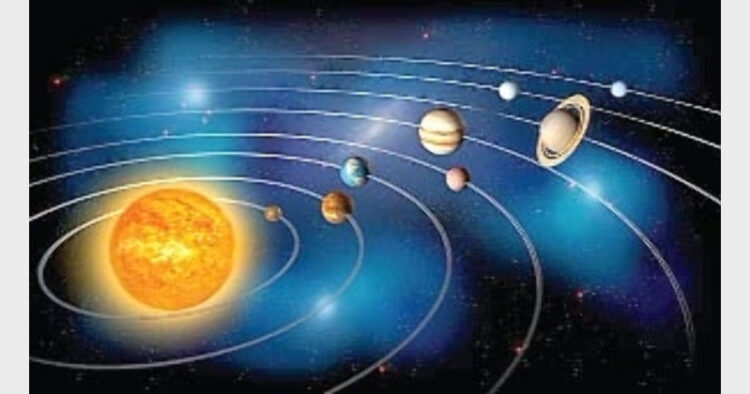Intro: Even after 54 years of acceptance by Central Government, most of us are not aware of the National Solar Calendar. India needs to think why our National Calendar is facing such indifferences in its own country?
Every nation has some symbolic venerable things. After Indepen-dence, India too adopted National anthem, flag, bird, animal and flower. All these adoptions were instantly accepted by public. In due course, we changed our coins. Paise took place of anas and pai. We adopted decimal-system for weights and measures and currency. But people didn’t accept the ‘National Calendar’.
Even after period of 54 years, people are not even aware of it. Why this apathy? Instead of debating on these questions, every patriotic citizen must accept National Calendar and start using it. What exactly is the National Calendar? What are its peculiarities? So far, no enough efforts were made to give explanations to public for these questions.
In 1952, our leaders realised the need of a National Calendar and subsequently, a Calendar Reform Committee was appointed. Physicist Dr Meghanad Saha was its chairman. The committee studied various prevailing calendar systems and prepared the National Calendar, which the Government of India accepted on March 22, 1957. According to the National Calendar that was the 1st day of Chaitra, 1879.
In case of chronometry in India, there is a wide range of diversity. For example, in some areas people believe in Lunar Month whereas in some areas, people believe in Solar Month.
 If chronometry is done according to Lunar Month, there are 354 days in a year. Therefore, there is no agreement between lunar months and seasons. Seasons depend on solar orbit. Hence, the calendar based on annual solar orbit, is practically convenient. Our daily routine is with reference to day and night.
If chronometry is done according to Lunar Month, there are 354 days in a year. Therefore, there is no agreement between lunar months and seasons. Seasons depend on solar orbit. Hence, the calendar based on annual solar orbit, is practically convenient. Our daily routine is with reference to day and night.
The concept of 24 hours a day is also convenient. Although for festivals, we use calendar based on lunar-months, we use Solar Calendar for our daily routine. Dr Saha committee has also recommended a different and peculiar Solar Calendar in place of prevailing English (Gregorian) Calendar.
How is our National Solar Calendar scientific?
The English Calendar which is presently in use has many scientific shortcomings. For example, there is no agreement between months and physical weather changes, names of twelve months are also unscientific, same names of kings became customary as months’ names. Considering all these shortcomings, it was decided that March 22 to be the first day of the year in National Calendar. This day is known in National Calendar as first day of Chaitra. March 22 is the 1st day of the year because on this day, hours of day and night are equal (that is:12).
The sun is inclined towards northern hemisphere for 6 months and towards southern hemisphere for 6 months. The sun's stay is more in northern hemisphere than in southern hemisphere. Therefore, there are 31 days in 5 months (from Vaishakh to Bhadrapad) and 30 days in 6 months (from Ashwin to Falgun).
Except leap year, there are 30 days in Chaitra month and only in leap year, there are 31 days. In National Calendar “Shalivahan Saka” is used for counting years. Since the beginning of National Calendar is March 22, it also matches with the Financial Year. This is a plus point of National Calendar.
National Calendar is neglected by public
It is a matter of regret that although National Calendar was accepted by our government on March 22, 1957, it is yet not in daily use. It is used only in government affairs, in government gazettes, in news papers, in Radio Station and in international agreements. Thus, its existence is limited to these places only. It is a bitter truth that public has not accepted National Calendar for daily use. Probably most of us are not even aware that there exists such National Calendar. Main reason for such negligence is lack of pride for nation. Strong political willpower would have made public to accept and use it, in daily routine like Metric System.
What do we need to do?
In order to bring National Calendar in force, following could be Action Plan:
- In English Calendar, Bharatiya months and dates should be printed bold and English months and dates should be printed in small size.
- In banking affairs, all documents and cheques etc. should bear the dates as per National Calendar.
- Banks, Institutes, Companies should print National Calendar in place of their own calendar.
- To educate and motivate public for using National Calendar.
- Schools and Colleges should follow National Calendar. As a result children will automatically follow National Calendar from their childhood.
- Birth and death certificates, school leaving certificates etc. should be issued as per the National Calendar.
- For correspondence, marriage invitations, invitation cards, all routine transactions, we should follow National Calendar. In the beginning joint Calendars (English + National Calendar) could be followed. For example, saur 23 kartik sakas 1933 i.e. November 14, 2011.
Implementation of National Calendar is already delayed but for the sake of national pride, let us be committed for avoiding further delay.
(Reference: Credit Information Review
September 1992 issue, Sr No 158
Original Article translation
written by Shri PH Dalal
Shri VY Joshi published in Lokmat, Pune
Dated : 25/2/12011)














Comments